
Dear friend of FAI:
I’d like to share with you some of our recent activities, including new analysis from the Policy team, project updates from Labs, and other developments across the Foundation for American Innovation.
Our 10-year anniversary gala and conference, Reboot24: The New Reality, will take place September 4–5 at Fort Mason, San Francisco, featuring a keynote from Garry Tan, president and CEO of Y Combinator. We’d love to see you there! You can learn more and purchase tickets here.
Then, on September 6 in San Francisco, we’ll be hosting the Bottlenecks Summit, an unconference for thinkers, builders, creators, and policy entrepreneurs working to overcome bottlenecks to human progress and abundance. The Summit is a joint effort of FAI, the Abundance Institute, and the Institute for Progress, along with individuals Brooke Bowman, Mark Lutter, Nadia Asparouhova, and Patrick Blumenthal. You can apply to participate here.
We’re excited to have Policy Manager Thomas Hochman joining as a full-time member of the team. He’ll be focusing on regulatory and infrastructure policy and will be developing a new project at FAI on permitting and regulatory obstacles to clean energy in the U.S. For a taste of his work, I encourage you to read his essay in American Affairs, “It’s Not Just NEPA: Reforming Environmental Permitting.”
Last Friday, the Supreme Court overruled Chevron deference, the 40-year-old precedent holding that courts should broadly defer to agencies in their interpretation of statutes. This will significantly reallocate constitutional power among the three branches, restoring not only judicial responsibility to interpret the laws, but also Congress’s responsibility to write laws more precisely and to oversee their administration more carefully. We’ve been working for years to modernize Congress and strengthen the legislative branch’s policymaking capacity and are prepared to use this inflection point to advocate for a more effective Congress.
Research
Our policy team had a busy quarter, working to strengthen national security, improve American governance, and keep America at the forefront of technological dynamism.
Reports, Testimony, Letters, and Comments
We are planning an upcoming symposium, Reforming Chevron, Restoring Congress: Legislative Responses to Changing Deference Doctrines. The symposium is a joint project of FAI and the Antonin Scalia Law School’s C. Boyden Gray Center for the Study of the Administrative State. The symposium will publish new papers that address the challenges and opportunities Congress will face in response to the Supreme Court’s overruling of Chevron. If you’re interested in participating, please submit an abstract here or contact Director of Research Robert Bellafiore at robert@thefai.org. We’re already thinking about ways to help Congress rebuild its capacity; for example, Non-Resident Senior Fellow Satya Thallam and Head of Policy Dan Lips recently proposed that Congress require the Government Accountability Office (GAO) to create a mission team to focus on regulatory oversight.
For the summer issue of American Affairs, Senior Economist Sam Hammond contributed an essay on the scramble for AI computing power, arguing that “the future will be determined by those with access to large computing clusters and the energy needed to power them.” He considers how this scramble will affect both domestic competition within the U.S. and the larger U.S.-China tech competition.
On his Substack, Second Best, Sam offered “ninety-five theses on AI,” covering AI’s development, the relationship between new technologies and regime change, and ongoing efforts to regulate AI. The essay received several write-ups and responses, including in Politico’s Digital Future Daily and the AI Daily Brief podcast.
Media Fellow Evan Swarztrauber and I led a coalition letter to House Speaker Johnson and Minority Leader Jeffries, calling for Congress to take up the Removing Our Unsecure Technologies to Ensure Reliability and Security (ROUTERS) Act. The legislation would require a report from the Department of Commerce on potential risks posed by consumer internet routers, modems, and other technologies produced by companies based in or controlled by foreign adversary nations. As we explain, the legislation would help Congress understand our technological vulnerabilities in products produced in nations such as China and Russia. The letter received a write-up in POLITICO Pro.
Satya testified before the Senate Committee on Homeland Security and Governmental Affairs for a hearing on “Restoring Congressional Oversight over Emergency Powers: Exploring Options to Reform the National Emergencies Act.” He discussed proposed updates to the legislation, which shapes Congress’s “impossible task of delineating suitable responses to exigent and often unforeseeable circumstances during which it can delegate effective but limited powers to the Executive Branch.”
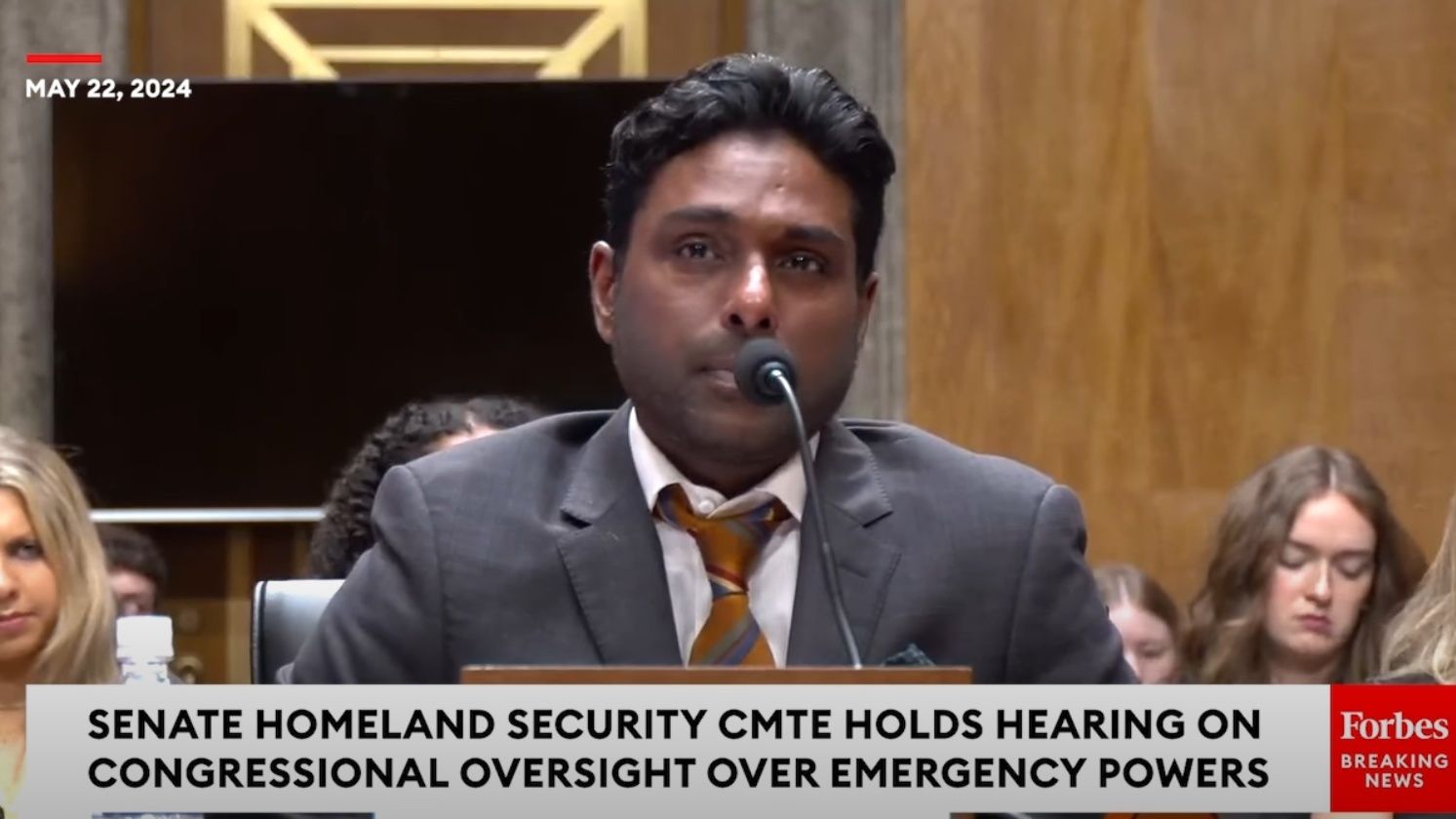
Non-Resident Senior Fellow Richard Reisman published a paper with the Centre for International Governance Innovation on how the democratization of access to online media tools is transforming human discourse. He calls for prioritizing the listener’s freedom of impression, and for governance to restore individual and community agency.
Evan and Director of Policy and Outreach Luke Hogg submitted comments to the Federal Communications Commission regarding ways to close the rural digital divide. They urge the FCC to reject all-or-nothing thinking about amnesty for grantees of the Rural Digital Opportunity Fund and Connect America Fund II, and offer recommendations to minimize the risks of moral hazard while ensuring that rural America gets connected.
We’ve submitted several appropriations testimonies to Congress in recent months:
- I submitted testimony to the House and Senate Subcommittees on the Legislative Branch, arguing that if the Supreme Court discards Chevron deference, Congress could find itself unprepared to execute its renewed responsibility for regulatory oversight. If Congress is to reclaim some of its constitutional role under Article I, it must show that it can develop the knowledge, expertise, and capabilities to govern.
- Dan submitted testimony to the same subcommittees, supporting the Comptroller General’s FY2025 budget request for GAO, given the agency’s significant taxpayers savings, and offering recommendations to improve GAO’s return on investment.
- Robert submitted testimony to the House Subcommittee on Labor, Health and Human Services, Education, and Related Agencies, arguing that the Department of Education could strengthen its education R&D efforts by improving their transparency, increasing the timeliness of the Department’s statistical collection efforts, and eliminating ineffective or unproven R&D programs.
- Robert submitted testimony to the House and Senate Subcommittees on Commerce, Justice, Science and Related Agencies, recommending that the subcommittees direct the National Science Foundation to improve its reporting about the outcomes of its education R&D programs.
- Sam submitted testimony to the same subcommittees, calling for funding the Department of Commerce’s Bureau of Industry and Security, which plays an essential role in America’s technological competition with China.
- Dan submitted testimony to the same Senate subcommittee, recommending requiring the Department of Education to annually report on its oversight of postsecondary institutions’ compliance with Section 117 of the Higher Education Act.
- Dan submitted testimony to the Senate Subcommittee on Agriculture, Rural Development, Food and Drug Administration, and Related Agencies, calling for funding the Farm Service Agency to ensure that it can oversee disclosures of foreign investments in American land, especially investments from China.
- Dan submitted testimony to the House Subcommittee on State, Foreign Operations, and Related Programs State Department, recommending additional funding for the Open Technology Fund, which promotes the development of technologies that support internet freedom and counter digital authoritarianism.
- In a series of testimonies to the House Subcommittees on Homeland Security; Defense; and Agriculture, Rural Development, Food and Drug Administration, and Related Agencies, Dan recommended requiring the Departments of Homeland Security, Defense, and Agriculture to identify open recommendations from GAO that could yield substantial cost savings or other significant improvements.
- Manager of Technology Policy Josh Levine submitted testimony to the Senate Subcommittee on Financial Services and Government, calling for boosting the Federal Trade Commission’s technical capacity by directing funds towards the hiring of additional staff technologists and economists.
Commentary and Impact
Many policies that our scholars have advocated for saw progress this quarter.
- In April, President Biden signed a law requiring TikTok to either divest or face a ban. The FAI team has been involved in the debates over TikTok since 2020, from warning about TikTok’s false promises to secure Americans’ data, to testifying before Congress on TikTok’s ties to the Chinese Communist Party. The passage of this legislation is a major policy success, and we’re proud to have contributed to the effort.
- Thomas has called for the expansion of categorical exclusions—a tool for excluding infrastructure projects from onerous regulatory assessments—to geothermal energy. The Bureau of Land Management recently adopted two categorical exclusions, which will allow it to speed up the review and approval of proposals for geothermal exploration.
- In June, the House Appropriations Committee’s report accompanying the legislative branch funding bill included language reflecting long-standing FAI recommendations. The report requires GAO to establish a new initiative to drive the implementation of open GAO recommendations by establishing timelines for implementing recommendations. Dan has recommended setting deadlines on watchdog recommendations, including in testimony before a House Committee on Administration panel last year. As the Committee notes, this change could save billions and improve government operations. The report also requires congressional support agencies to report to Congress on efforts to strengthen Congress’s science and technology capacity, in line with my own recommendations.
- In another GAO success, the agency recently released a report describing what Congress could save by enacting “open matters for Congressional consideration.” This report was mandated by the Improving Government for America's Taxpayers Act, which became law in 2022. Last year, Dan testified and wrote that GAO's first report answering this mandate was a missed opportunity to highlight detailed cost savings that could be achieved through congressional action. GAO's new report includes detailed estimates of billions of dollars of potential savings for each recommendation for Congress.
- Thomas has written about how the National Environmental Policy Act’s onerous permitting reviews slow down environmental projects and often do more harm than good to the environment. In line with his recommendations, Representatives Bruce Westerman and Scott Peters recently introduced legislation reforming NEPA to speed up these permitting reviews and reduce the risks of wildfires.
- In the FY25 State, Foreign Operations, and Related Programs appropriations bill, the House Appropriations Committee renewed its commitment to supporting global internet freedom by providing $43.5 million for programs like the Open Technology Fund in FY2025. We’ve long supported these programs for helping to promote a free and open internet abroad. The Committee also called on federal agencies to report on how they use low-earth orbit satellites, in line with Dan’s recommendations.
- The House recently passed the FY25 National Defense Authorization Act, which contains the Countering CCP Drones Act. This bill would prohibit new models of drones produced by the Chinese drone company DJI from receiving authorization from the Federal Communications Commission to operate on U.S. communications infrastructure. We’ve previously warned about the dangers posed by Chinese drones, especially from DJI.
- We were pleased to see the Senate Homeland Security and Governmental Affairs Committee hold a hearing examining the Biden administration’s efforts to harmonize cybersecurity regulations. Streamlining federal cybersecurity regulations was Dan’s top recommendation when he testified before the committee in 2021.
- As noted above, we’ve written in support of the ROUTERS Act in the House, which would help Congress understand our technological vulnerabilities in products produced in countries such as China and Russia. We were pleased to see Senators Marsha Blackburn and Ben Ray Luján introduce a Senate companion to the legislation, bringing it one step closer to becoming law.
Our commentary included the following:
- Luke Hogg and Zach Graves, “Can We Trust Signal to Keep out Government Spying?” in Return
- Zach Graves and Marci Harris, “The Supreme Court Is About To Make Congress Reinvent Itself,” in Newsweek
- Thomas Hochman, “What's in the ADVANCE Act?”
- Robert Bellafiore, “The Regime You Change May Be Your Own,” in the American Mind
- Joshua Levine, “Into the Breach: Countering Chinese Digital Espionage in Routers,” in the National Interest
- Luke Hogg and Jeffrey Westling, “Ending the Spectrum Wars,” in the National Interest
- Dan Lips, “Federal and State Transparency Reforms to Expose Malign Foreign Influence,” Parts I and II, on the National Security Institute SCIF blog
- Robert Bellafiore, “Can AI Make Us Again a People of the Word?” in Public Discourse
- Robert Bellafiore, “The Anomaly of Economic Growth,” in City Journal
- Roslyn Layton, “Increasing Regulatory Burdens Doesn’t Improve Security,” in RealClearDefense
- Joshua Levine, “Don't Make the FTC the Digital Regulator,” in RealClearMarkets
- Reynold Schweickhardt, “The Federal Reserve's War On Cybersecurity,” in RealClearMarkets
- Robert Bellafiore, “Campus Mayhem, Funded by Our Adversaries,” in the Washington Examiner
- Joshua Levine, “Is the TikTok Bill a Bill of Attainder?” at the Federal Society blog
- Reynold Schweickhardt, “Congress Should Address Recurring Cases of Cyber Espionage at Home,” in the Federal Times
- Luke Hogg, “Apple Should Not Be Exempt From the Antitrust Tomahawk,” in the American Conservative
- Roslyn Layton, “Live Nation’s Anticompetitive Conduct Is A Problem For Security,” in ProMarket
- Roslyn Layton, “Improving Truck and Train Safety,” in the Regulatory Review
- Roslyn Layton, “The SEC Came to Destroy Crypto, Not to Regulate It,” in DVJournal
- Robert Bellafiore, “Art and Politics: A Permanent Dissonance?” in Fusion
- Robert Bellafiore, “A Gentleman Out of Moscow,” in the University Bookman
- Sam Hammond and Erich Grunewald, “Spreadsheets vs. Smugglers: Modernizing the BIS for an Era of Tech Rivalry”
- Dan Lips, “Improving Accountability at Veterans Affairs”
- Sam Hammond, “California’s Push to Regulate AI Goes too Far”
- Satya Thallam and Dan Lips, “Congress May Soon Have More Homework”
Highlights among our media hits included the following:
- I spoke to the New York Post about TikTok’s failed government relations strategy and its inability to explain away its relationship to the Chinese Communist Party.
- Evan was quoted in StateScoop’s coverage of the Federal Communications Commission’s vote on net neutrality rules.
- Thomas joined American Compass’s podcast to discuss the future of American energy and regulatory obstacles to nuclear power.
- Evan spoke to Canada’s News Forum about Apple’s removal of apps from the App Store in China and the company’s longer history of following Beijing’s orders.
- Luke spoke to Blaze Media about the recent extension of Section 702 of the Foreign Intelligence Surveillance Act and how digital technology affects citizens’ privacy against government surveillance.
Labs
It’s been an exciting quarter for the Labs team. Our goal is to bring technology and creative partnerships to bear in solving high-stakes problems facing our country, and we’re pleased to report on the success that our products are seeing.
Schoolahoop
2024 continues to be a great year for Schoolahoop, our platform for school choice. The platform streamlines the process of identifying the right school by helping parents find relevant schools and scholarships, connecting them to program administrators, and showing parents what options fit their needs. We’re happy to say that user growth has nearly doubled year over year.
Now, we’re working on new features and expansions to reach even more users. Soon, we’ll be launching a “Claim Your School” feature, which will allow school administrators to claim and update their Schoolahoop individual school profiles so that parents have up-to-date information, including seat availability data on a per-grade level. This feature is critical to our monetization strategy and will help Schoolahoop become self-sustaining.
We’re also working to expand Schoolahoop to new states, including South Carolina, Arkansas, New Hampshire, Mississippi, and Montana. We’re confident that Schoolahoop can be a major player in the adoption of new education savings accounts in states across the country.
Events
This quarter, we hosted events across the country with some of our favorite organizations and thinkers.
In April, FAI hosted a salon dinner in New York City led by Senior Advisor Alexei Bulazel and Senior Fellow Jon Askonas to discuss defense innovation and the cyber agenda for a new presidential administration.
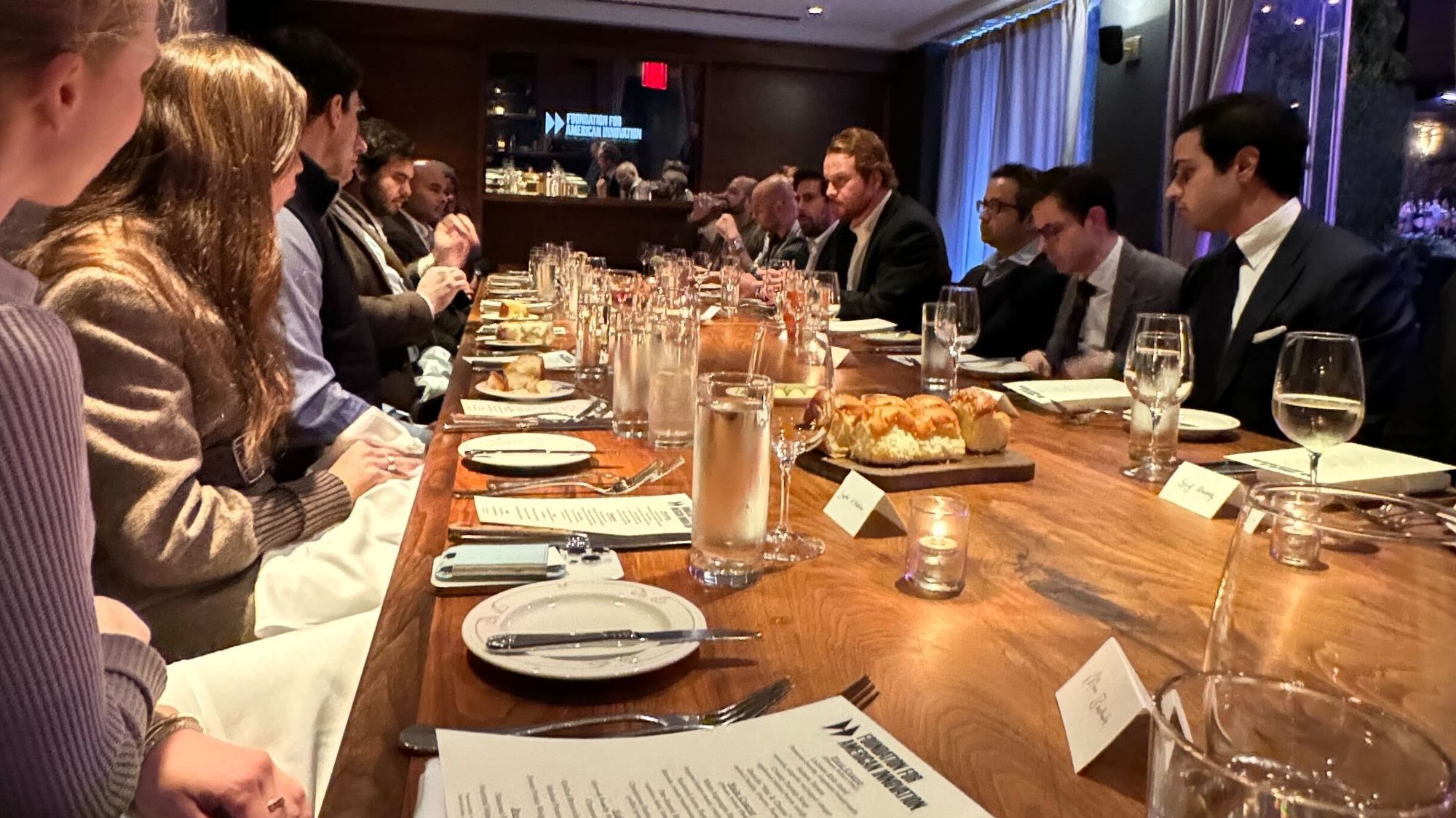
We co-sponsored an Abundance Happy Hour in DC with the Inclusive Abundance Initiative, Breakthrough Institute, Institute for Progress, and Niskanen Center to discuss the ideas and policies behind a more abundant future.
The day that President Biden signed the legislation forcing the sale of TikTok, we partnered with Young Voices for a debate in DC on the merits and implications of the legislation. The debate featured Michael Sobolik of the American Foreign Policy Council and Matt Stoller of the American Economic Liberties Project, facing off against Jennifer Huddleston of the Cato Institute and Mike Godwin of Godwin’s Law Consulting.
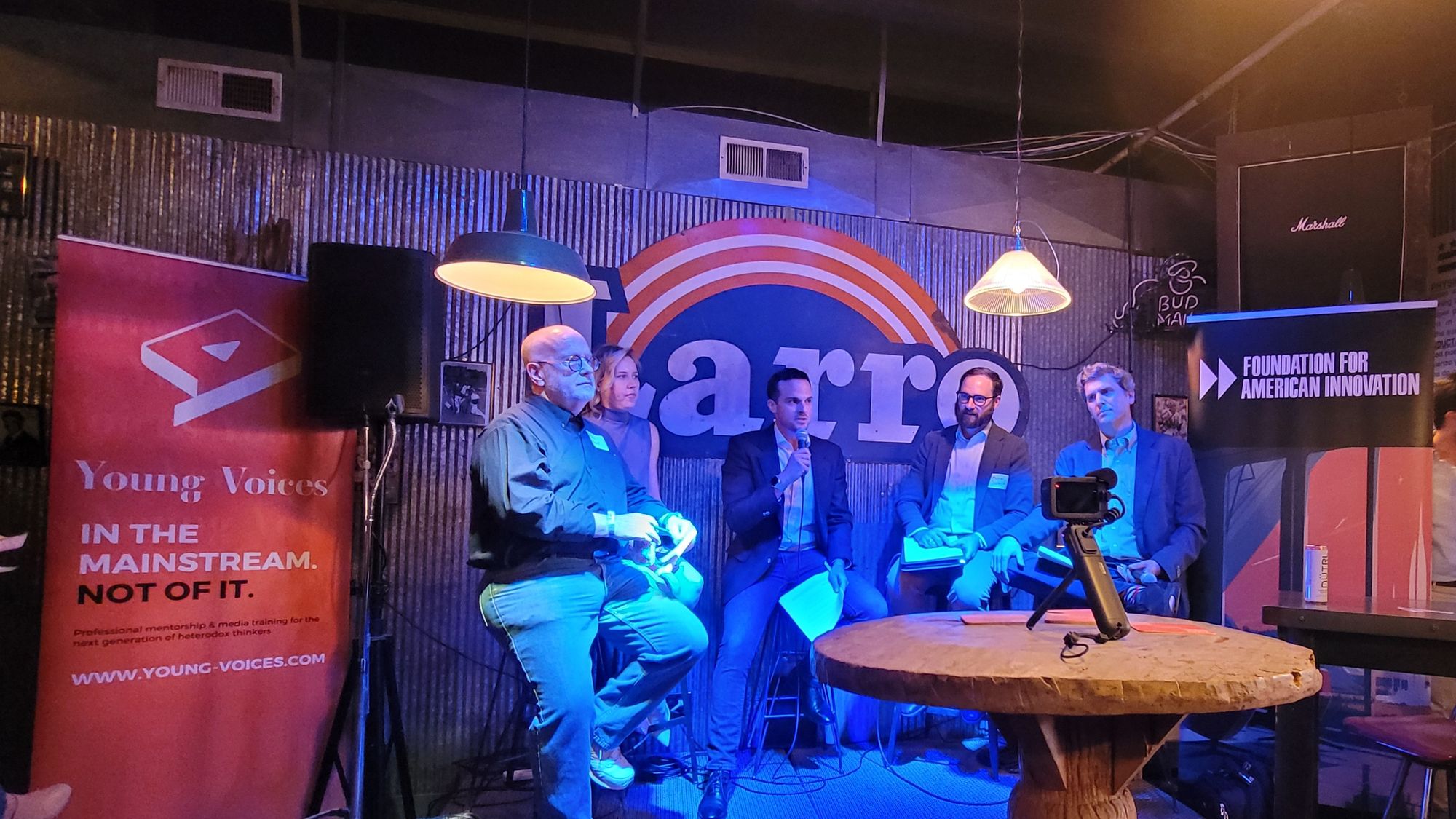
At Stanford University, we partnered with the Stanford Cyber Policy Center to host a symposium, Shaping the Future of Social Media with Middleware. The symposium brought together scholars and policymakers to discuss the evolution of social media and the emerging role of middleware. In the coming months, we’ll be releasing a paper informed by the day’s conversations, offering recommendations and a roadmap for developers, investors, and policymakers.
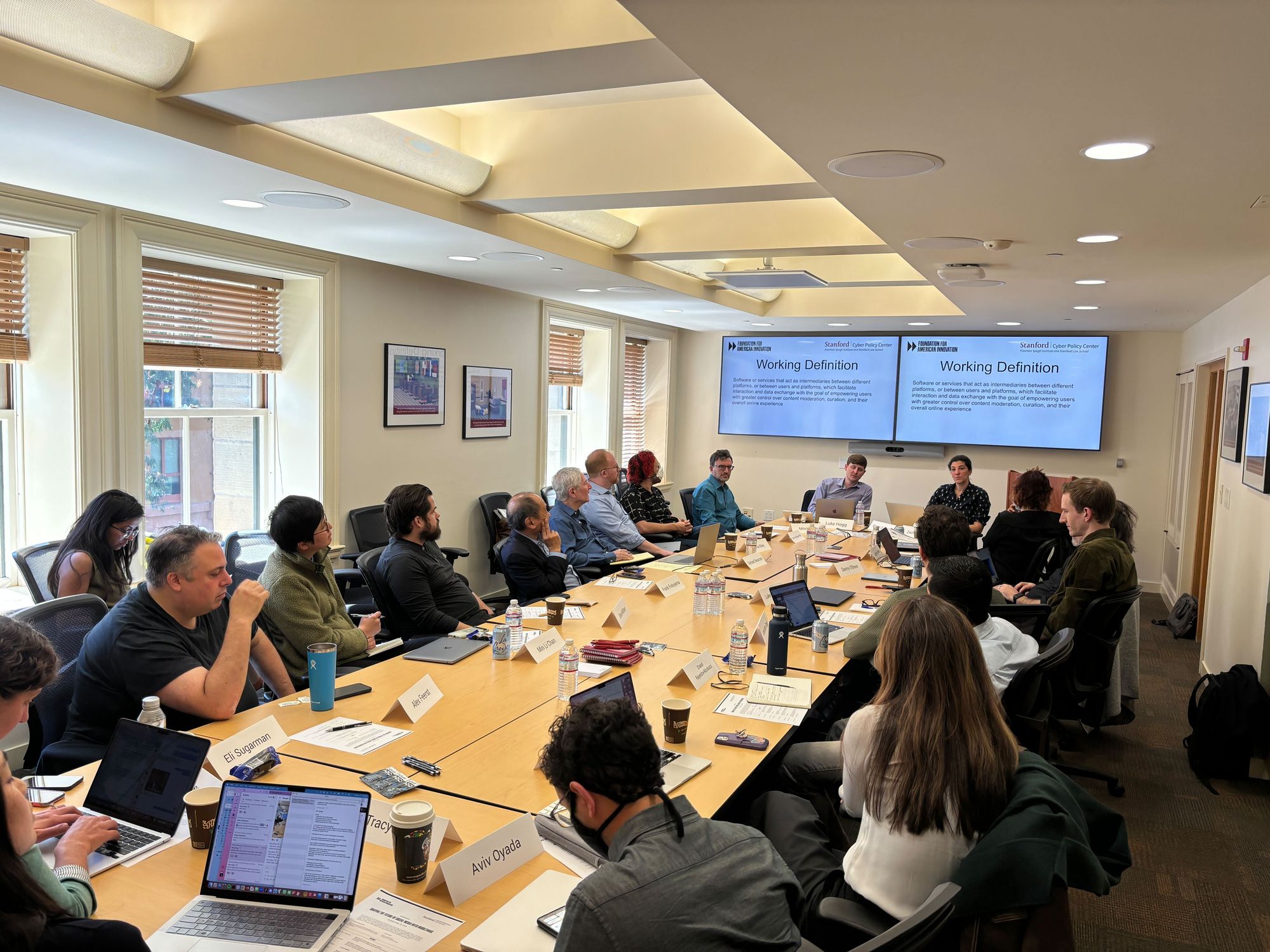
In May, we partnered with 8VC for a night in San Francisco on “The Future of AI: The Cathedral vs. the Bazaar.” Sam was joined by Andrew Côté from Hyperstition and Guillaume Verdon from Extropic to consider their visions for the future and the tradeoffs between centralized and decentralized AI.
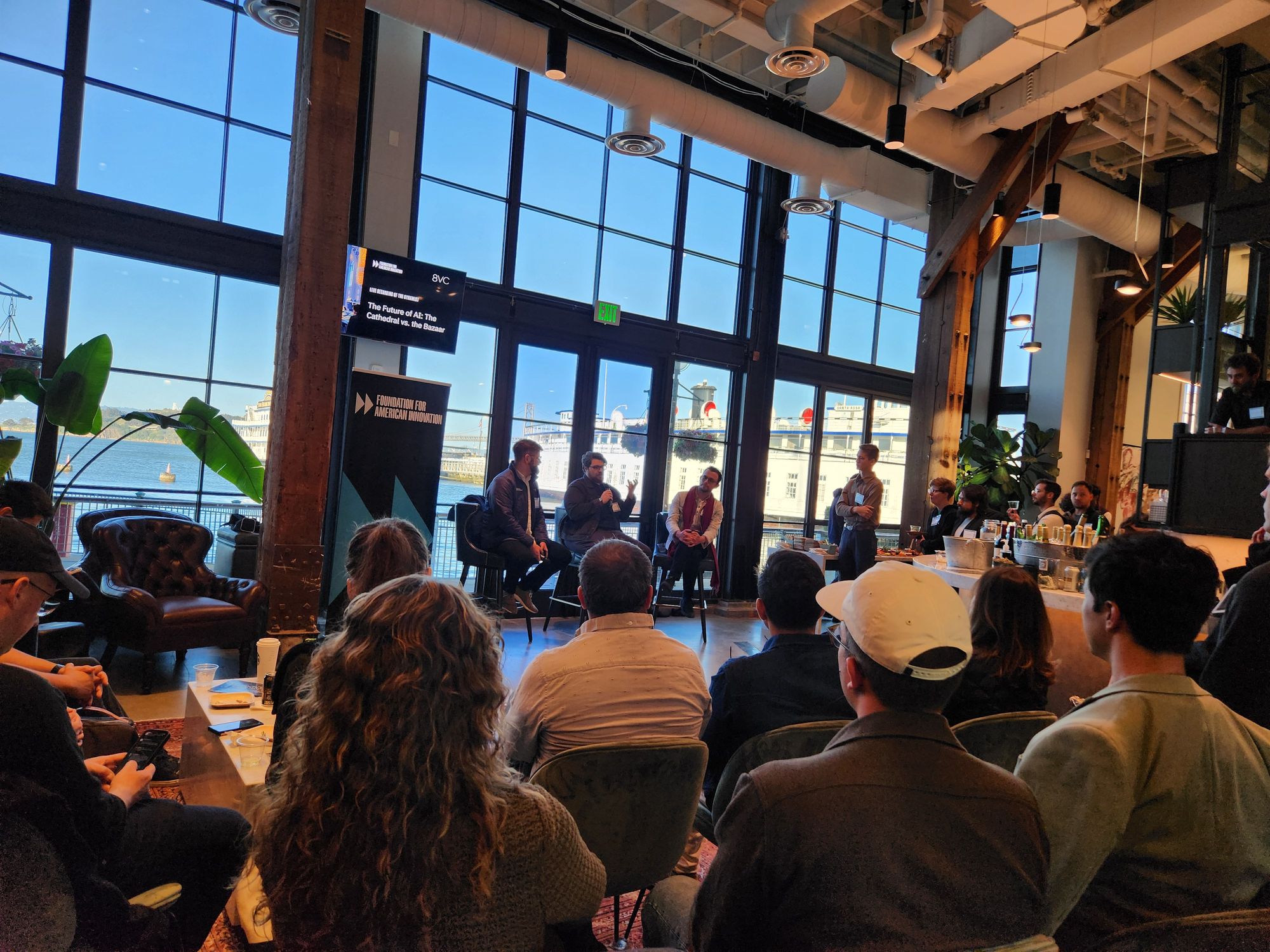
On the eve of the Hill and Valley Forum, FAI convened investors, builders, and think tankers in DC for a conversation about defense innovation and the future of DC-Silicon Valley partnerships, led by Jon and Senior Advisor Zak Kukoff.
Other highlights among the events our scholars spoke at included the following:
- At a conference hosted by the Data Transfer Initiative, I spoke on a panel about “Data Laws, Rights and Regulations,” and the role of governance in supporting data portability, interoperability, and privacy.
- At a salon hosted by Interintellect, Jon discussed how technology has made it possible to “Choose Your Own Reality.”
- Luke spoke to Meta's small business leadership advocacy cohort about the importance of openness in the tech ecosystem for the competitiveness of small businesses in the digital economy.
- Thomas spoke on a panel with American Moment about “Why We Can’t Build Anything” and how the Clean Air Act has become a regulatory barrier to U.S. manufacturing.
- Dan gave the keynote address at the Parents for School Options summit in Miami. He discussed the national movement to give parents control of education resources through education savings accounts, and considered how FAI’s Scholahoop and Project Nickel can help by informing parents of their education options.
- Richard joined a panel at Public Knowledge’s Emerging Tech conference to discuss “The Decentralized Web: Solutions for the Challenges of Centralized Technology.”
Podcasts
On our podcast, The Dynamist, Evan brought on some of today’s most important thinkers and doers to discuss the future of technology, governance, and innovation. Recent episodes have featured FCC Commissioner Nathan Simington, Alliance for the Future’s Brian Chau and the Mercatus Center’s Dean Ball, and the American Foreign Policy Council’s Michael Sobolik.
Media Fellow Marshall Kosloff and Saagar Enjeti have continued hosting the podcast The Realignment, which is sponsored by FAI. They’ve had conversations in recent months with figures such as Steven Teles, Johns Hopkins University Professor and Niskanen Center Senior Fellow; Bayard Winthrop, Founder and CEO of American Giant; and Edward F. O'Keefe, CEO of the Theodore Roosevelt Presidential Library Foundation.
Book Recommendations
The FAI team has been getting into some great books in recent months. Here are a few that members of the FAI team recommend:
- The Best and the Brightest, by David Halberstam
- Pieces of the Action, by Vannevar Bush
- Washington: A Life, by Ron Chernow
- Surveillance Valley: The Secret Military History of the Internet, by Yasha Levine
- A Time to Keep Silence, by Patrick Leigh Fermor
- Invisible Rulers: The People Who Turn Lies into Reality, by Renée DiResta
- Hegel's Phenomenology of Spirit: A Commentary Based on the Preface and Introduction, by Werner Marx
- Softwar: A Novel Theory on Power Projection and the National Strategic Significance of Bitcoin, by Jason P. Lowery
- The Image: A Guide to Pseudo-Events in America, by Daniel J. Boorstin
- Purity, by Jonathan Franzen
- The Wolves of K Street: The Secret History of How Big Money Took Over Big Government, by Brody Mullins and Luke Mullins
- Joseph McCarthy: Reexamining the Life and Legacy of America's Most Hated Senator, by Arthur Herman
- Lonesome Dove, by Larry McMurtry
- Earning the Rockies: How Geography Shapes America's Role in the World, by Robert D. Kaplan
- Poor Charlie’s Almanack: The Essential Wit and Wisdom of Charles T. Munger, by Charles T. Munger
You can also see a longer list of our recommendations on our Bookshop page.
Coming Soon
We have many projects in the works and are excited about the next few months. We’ll be publishing reports on the challenges of tracking recent infrastructure spending, the principles behind network neutrality for telecommunications, how drones can improve border security, and more. Most of all, we’re excited for Reboot24 and the Bottlenecks Summit in September in San Francisco. We hope to see you there!
Thank you for following our work. We appreciate your continued interest in FAI and welcome any questions or feedback.
If you’d like to support our mission, you can donatehere.
Sincerely,
Zach Graves
Executive Director
Foundation for American Innovation